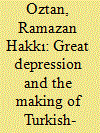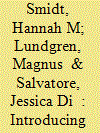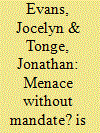|
|
|
Sort Order |
|
|
|
Items / Page
|
|
|
|
|
|
|
| Srl | Item |
| 1 |
ID:
172454


|
|
|
|
|
| Summary/Abstract |
This article explores how the Great Depression in 1929 led to the expansion of illicit circuits globally, and examines the ways in which the introduction of anti-smuggling campaigns came to consolidate the border regimes in Turkey and French Syria. The global economic downturn in the late 1920s led states to embrace protectionist measures such as heightened tariffs and import quotas, all designed to protect local industries and maintain a favorable trade balance. The introduction of such measures, however, often resulted in the emergence of highly profitable illicit circuits, including in the borderland between Turkey and Syria. Here, a sturdy coalition of producers, shop owners, smugglers, trackers, and peddlers began to smuggle into Turkey a range of goods from silk textiles to cigarette papers, while funneling out narcotics into Syria. By seeking the global trajectories of such commodity flows, this article examines the impact of these borderland mobilities on the making of Turkey's southern border by exploring the local and bureaucratic responses to a rapidly changing world economic order in the aftermath of the Great Depression.
|
|
|
|
|
|
|
|
|
|
|
|
|
|
|
|
| 2 |
ID:
186332


|
|
|
|
|
| Summary/Abstract |
Research on UN peacekeeping operations has established that operations' size and composition affect peacekeeping success. However, we lack systematic data for evaluating whether variation in tasks assigned to UN peacekeeping mandates matters and what explains different configurations of mandated tasks in the first place. Drawing on UN Security Council resolutions that establish, extend, or revise mandates of 27 UN peacekeeping operations in Africa in the 1991–2017 period, the Peacekeeping Mandates (PEMA) dataset fills this gap. It records 41 distinct tasks, ranging from disarmament to reconciliation and electoral support. For each task, the PEMA dataset also distinguishes between three modalities of engagement (monitoring, assisting, and securing) and whether the task is requested or merely encouraged. To illustrate the usefulness of our data, we re-examine Hultman, Kathman, and Shannon’s (2013) analysis of operations’ ability to protect civilians. Our results show that host governments and rebel groups respond differently to civilian protection mandates.
|
|
|
|
|
|
|
|
|
|
|
|
|
|
|
|
| 3 |
ID:
110762


|
|
|
|
|
| Publication |
2012.
|
| Summary/Abstract |
Dissident Irish Republicans have increased their violent activities in recent years. These "spoilers" reject the 1998 Good Friday Agreement power-sharing deal between Unionist and Nationalist traditions in Northern Ireland. Instead dissident IRAs vow to maintain an armed campaign against Britain's sovereign claim to Northern Ireland and have killed British soldiers, police officers, and civilians in recent years. These groups have small political organisations with which they are associated. The assumption across the political spectrum is that, whereas Sinn Fein enjoyed significant electoral backing when linked to the now vanished Provisional IRA, contemporary violent Republican ultras and their political associates are utterly bereft of sympathy. Drawing upon new data from the Economic and Social Research Council 2010 Northern Ireland election survey, the first academic study to ask the electorate its views of dissident Republicans, this article examines whether there are any clusters of sympathy for these irreconcilables and their modus operandi. The piece assesses whether there are any demographic, structural, ideological, religious, or party trends indicating Republican dissident sympathies. It also assesses the extent to which dissidents are seen as a threat and examines whether this perception is shared evenly across Northern Ireland's two main communities.
|
|
|
|
|
|
|
|
|
|
|
|
|
|
|
|
|
|
|
|
|